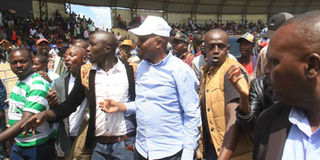Why the opposition epicentre is shifting to Ruto’s Rift Valley

Gatundu MP Moses Kuria walks out of the Building Bridges Initiative rally at Kinoru Stadium in Meru town after he was denied a chance to speak, February 29, 2020. PHOTO | FILE | NATION MEDIA GROUP
What you need to know:
- Notably off the BBI calendar is a rally pencilled for Nakuru on March 21.
- Many Kenyans out there will actually feel relieved that the rally has been cancelled.
- Media attention on Nakuru had made it look like some landmark political event this year.
A major casualty of Friday’s confirmation of the first case of the new coronavirus in Kenya is politics.
The government guidelines banning public gatherings effectively mean that any rallies meant to popularise or oppose the proposed constitutional reforms under the Building Bridges Initiative (BBI) won’t take place for the foreseeable future.
As social media commentators immediately observed, “corona has stopped reggae” — a clever dig at the pro-reforms brigade that had picked a line from the popular song by South African reggae maestro Lucky Dube to taunt their opponents. Notably off the BBI calendar is a rally pencilled for Nakuru on March 21.
HOSTILITY
The open hostility displayed by some local politicians towards the Nakuru meeting had raised concerns about a possible outbreak of violence in the county with a history of ethnic tensions.
President Uhuru Kenyatta reportedly raised similar concerns when he hosted county governors organising the meeting at State House early last week.
Many Kenyans out there will actually feel relieved that the rally has been cancelled.
Media attention on Nakuru had made it look like some landmark political event this year.
Yet, other than the anticipated violence, it would have been a fairly routine activity involving one group hoping to take its message to a perceived hostile political territory and the other one trying to protect its perceived home turf.
If you were interested in any signs of Kenya’s changing political landscape, you only needed to watch the events in the neighbouring Baringo and Uasin Gishu where Deputy President William Ruto’s supporters took to the streets in Kabarnet and Eldoret, respectively.
DEMOS
The Eldoret demo went down while the Deputy President toured projects a little far away in Nandi County and there was nothing to suggest that he had anything to do with it.
Demos are also not new in Eldoret, although people there tend to protest more about maize and fertiliser prices than political grievances.
But coming in the wake of recent anti-establishment outbursts by Mr Ruto, depicting him as an outsider in government, the Eldoret and Baringo protests betrayed a siege mentality often associated with opposition strongholds.
Placards with such messages as “No Ruto, No BBI” or “Uhuru Respect Ruto” are straight from the riots book of street-battle-hardened protesters of Kondele in Kisumu.
POLITICAL TRUCE
With the political truce or the Handshake between President Kenyatta and his arch-rival Raila Odinga holding for the second year and Mr Ruto getting isolated in the 2022 succession race, the epicentre of opposition politics appears to be shifting from Kondele to Eldoret and Kabarnet.
Well, the demos have been stopped by the coronavirus as well. But they might well resume in waves in Kenya’s newly minted opposition strongholds.
[email protected]. @otienootieno





